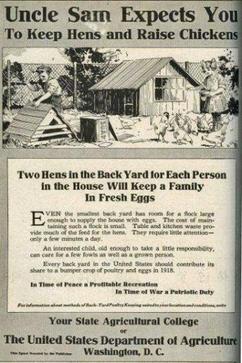Question: What do the northeastern Illinois communities of Arlington Heights, Batavia, Chicago, Downers Grove, Evanston, Hoffman Estates, Naperville, Northbrook, Oak Park, Plainfield, and St. Charles have in common with Cincinnati, OH; Nashville, TN; Pittsburgh, PA; Sioux City, IA; and Topeka, KS?
Answer: All of them allow city residents to keep backyard chickens for egg production.
 Here in Joliet, there’s a grassroots movement aflutter to legalize residential chicken-keeping, a plucky proposal I enthusiastically support.
Here in Joliet, there’s a grassroots movement aflutter to legalize residential chicken-keeping, a plucky proposal I enthusiastically support.
The virtues of city and suburban backyard hens are many and various. As noted by the local advocacy organization J-Hens (Joliet Healthy Eggs in Neighborhoods), urban chickens:
- provide fresh and nutritious eggs that are far superior to most purchased in supermarkets (I know; I’ve tasted ’em);
- recycle food waste by consuming kitchen scraps and producing valuable compost for gardens;
- tap into the historically significant American tradition of backyard hen-keeping; and
- are fun family pets that provide our technology-distracted children with animal companionship, healthy outdoor activity, and instructive caretaking chores.
To be sure, uninformed naysayers wrongly assume that backyard chickens are dirty, noisy, and detrimental to local property values. I do know many so-called humans who fit such a description, and I bet you do, too. But not our dirt-scratching, bug-eating feathered friends. (Yes, folks — chickens love to eat bugs. What’s not to like about that?)
Let’s start with the property value myth. First of all, the irresponsible wrongdoings of many American financial institutions have wreaked exponentially more havoc upon the local housing economy the last five years than anything a few little hens down the alley could ever do.
 Secondly, just look again at the list of cities above: does anyone really believe that the affluent communities of Arlington Heights, Evanston, Naperville, and the regulation-obsessed Oak Park — all cities with far higher average home values than Joliet — would’ve approved their backyard hen ordinances if property values were truly at risk? I rest my case.
Secondly, just look again at the list of cities above: does anyone really believe that the affluent communities of Arlington Heights, Evanston, Naperville, and the regulation-obsessed Oak Park — all cities with far higher average home values than Joliet — would’ve approved their backyard hen ordinances if property values were truly at risk? I rest my case.
What about the chicken poop? you ask. Won’t it be stinky? Of course it will — IF YOU DON’T CLEAN IT UP. Again, let’s get real. Our present-day urban landscape is constantly bombarded with doggy doo-doo from the tens of thousands of dogs slobbering along in our midst and treating our lawns and parkways as their personal bathrooms. These putrescent pooch piles are large, stinky, and messy — I know because I’ve cleaned a lot of them up in my 45 years. But do we outlaw the keeping of dogs as household/backyard pets because of their daily defecations? No — we simply expect their owners to deal with the waste properly.

And as for alleged noise problems: we’re not talking roosters here. Hens are quiet and unaggressive compared to those preening and caterwauling males of the species, not to mention yappy canines and loudmouth people. (You know who you are.)
If Joliet really wants to deal with urban noise issues, I suggest the Council turn its attention to the bass-thumping car stereos that rattle my teeth and jiggle my liver as I sit in my vehicle waiting for the stoplight to change. How about an ordinance against those aural abominations?
 More backyard chickens. Less liver-jiggling noise pollution. Now that would be progress!
More backyard chickens. Less liver-jiggling noise pollution. Now that would be progress!
I encourage all forms of urban gardening and farming, especially in my hometown, and recommend the J-Hens website to readers near and far. I also love doggies and my fellow man, contrary to what this article might imply. A version of this essay appears in the 5 June 2013 edition of the Joliet Herald-News as the creatively-titled “Backyard Chickens in Joliet.”
